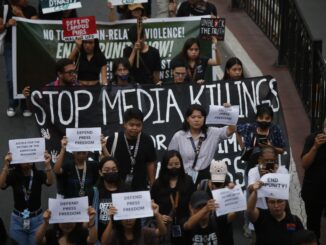
BAGUIO CITY, Philippines — Fifteen years after the Philippines witnessed the deadliest single attack on journalists in history, the country remains one of the most dangerous in the world for media practitioners, according to Reporters Sans Frontieres (RSF) or Reporters Without Borders.
In a report on the 115th anniversary of the so-called Ampatuan Massacre in Maguindanao, RSF said the Philippine government should “take decisive action to end impunity for crimes against the press.” The massacre, perpetrated by the Ampatuan family, targeted the rival Mangudadatu clan, left 58 people dead including 32 journalists. It was “the largest massacre of journalists in history,” the RSF said. Members of the Mangudadatu family, their supporters, and members of the media were on their way to Shariff Aguak town to file certificate of candidacy for Buluan vice mayor Esmael Mangudadatu when they were ambushed.
“It is appalling that, 15 years after this unspeakable massacre, the Philippines is still one of the world’s most dangerous countries for journalists, with 43 more media professionals murdered since,” Cédric Alviani RSF’s Asia-Pacific bureau director said.
“We stand with the victims’ families, demanding strong action from the Filipino government to end the impunity of both the perpetrators and masterminds of crimes against journalists,” Alviani said. He lamented that it took 10 years before the first convictions were handed down. While 44 of the perpetrators had been sentenced to prison terms ranging from six years to life, 88 others remain at large, Alviani said. Such delay in justice, he said, “highlights the authorities’ inability to curb violence against journalists.”
The RSF said it has documented the killing of 43 more reporters since the November 2009 massacre, making the Philippines “the most dangerous country for the profession in the Asia-Pacific region.”
The RSF lamented that even the creation of the Presidential Task Force on Media Safety in 2016, “failed to curb this violence and the community of journalists continues to pay a heavy toll.”
It cited the murder of radio host Cresenciano Bunduquin in May 2023 in Mindoro and that of another broadcaster Percy Lapid (aka Mabasa) in Manila in October 2022.
The RSF said it is working with authorities to combat impunity, like when it – along with A Safer World for the Truth coalition – shared information with law enforcers on the whereabouts of former Palawan governor Joel Reyes who masterminded the killing of local journalist Gerry Ortega in 2011. The information may have forced Reyes to surrender last September.
Alviani noted that Filipino journalists also face harassment and legal intimidation, noting “women journalists are particularly targeted with gender-based violence, including threats of rape, cyberbullying, and doxing (publication of personal information with malicious intent).”
The Philippines ranks 134th out of 180 countries and territories in RSF’s 2024 World Press Freedom Index.
For rights group Karapatan, justice remains elusive for the victims of the 2009 Ampatuan massacre even if a majority of the perpetrators had already been convicted.
Karapatan issued the statement as it expressed support for calls by the National Union of Journalists of the Philippines (NUJP) and other press freedom advocates for justice for the victims of the massacre.
Citing data from the NUJP, Karapatan said at least 199 media workers have been killed since the EDSA uprising in 1986. Of the figure, 140 were killed between 2000 and 2022.
“Given the Philippines’ deeply flawed justice system, there is no assurance that the guilty verdicts will not be reversed,” Karapatan secretary general Cristina Palabay said, referring to the conviction of the masterminds of the massacre by a Quezon City court. — Emmanuel Tupas




Be the first to comment